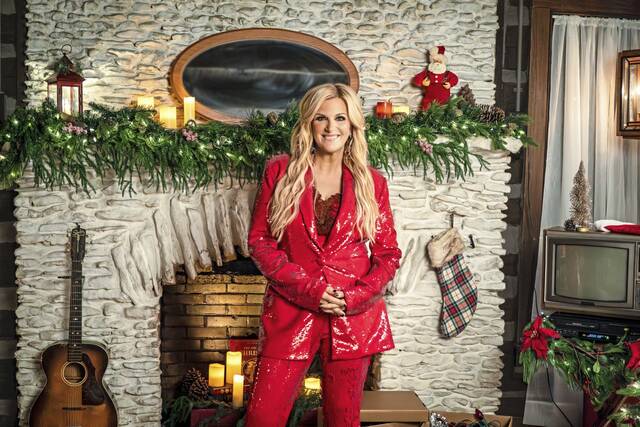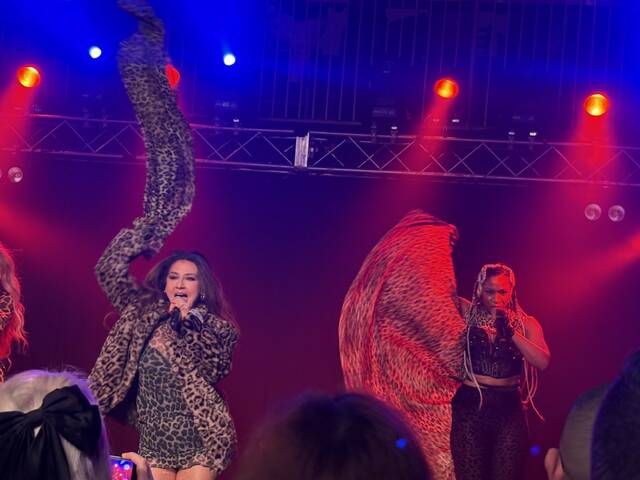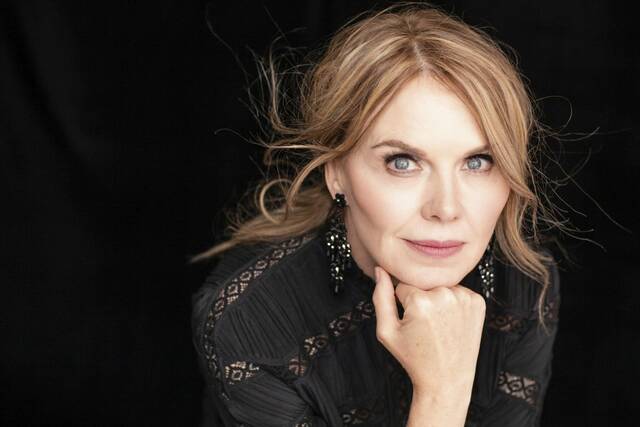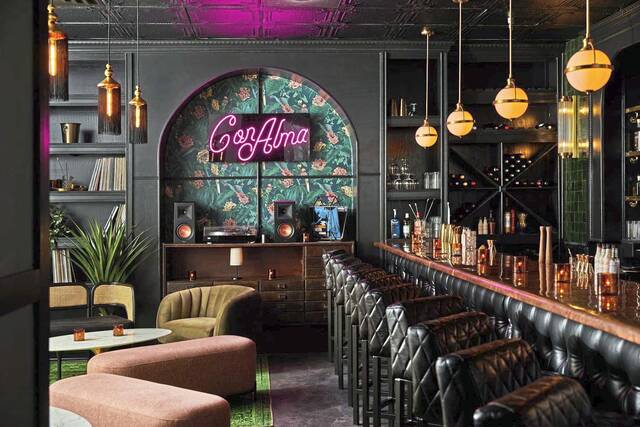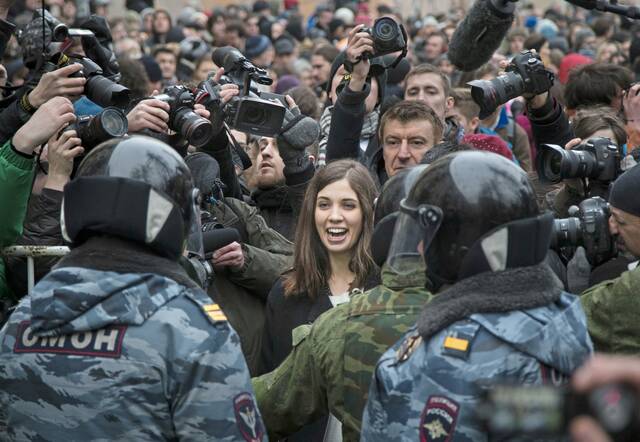If you set an alarm for 4:36 p.m. Saturday, you can mark exactly 60 years since the Beatles arrived in Pittsburgh.
On Sept. 14, 1964, four young men from Liverpool, England, took the stage at the Civic Arena. The venue was still practically sparkling new, having opened three years earlier in 1961.
The Beatles — with their iconic lineup of John Lennon, Paul McCartney, George Harrison and Ringo Starr — released their first single, “Love Me Do,” in 1962 and quickly shot to stardom in the United Kingdom. They built success over the next year and a half — both at home and abroad — with hits including “Please Please Me” and “From Me To You,” their first-ever appearance on American charts.
Then, in 1964, the full force of “Beatlemania” struck the United States, with the release of their hit album “Meet the Beatles!” and their first appearance on “The Ed Sullivan Show” on Feb. 9, 1964.
That moment was crucial in cementing The Beatles as one of the most popular rock bands in the world. They embarked on a North American tour that year, with Pittsburgh as the stop between Baltimore and Cleveland.
Bringing the Beatles to Pittsburgh
Pat DiCesare was the promoter who — along with his partner Tim Tormey — brought the Beatles to the ’Burgh. But it was his father, Dominic, who put up the money to reserve the tour date.
“My mother and dad had 10 kids. He was the only one who worked, he worked at Westinghouse Electric, the best he made may have been a dollar an hour. I never really asked them for the money,” DiCesare said.
At the time, DiCesare was working as a record promoter in the region. A friendly competitor played him a few songs by the Beatles early on. Even though they both loved the group’s sound, they predicted that the music wouldn’t sell well.
“Americans did not like British music. We thought they were corny as heck,” DiCesare said.
Of course, the Beatles would quickly prove them wrong.
Tormey sometimes brought concerts to the Civic Arena, but its 15,000-person capacity was too much for most acts at the time.
DiCesare went to Tormey with the idea of bringing the Beatles to town, but Tormey wasn’t really interested. “I said, ‘Well, you know what, if you don’t want to do them, I’d like to do it.’ He said something like ‘Well, where are you going to get the money to do it?’” DiCesare said.
After working to figure out who represented The Beatles, DiCesare heard back from a contact at the William Morris Agency. “She got back and she said, ‘I don’t know about this, but if you want to talk about the Beatles, you gotta get $5,000 cash, put it in a brown paper bag and deliver it to a bartender … in Brooklyn and you have to do it within 48 hours and you might have a chance to get the Beatles,’ ” he said.
Unsurprisingly, he had a hard time finding a partner willing to put up the money within the first 24 hours. “Everybody thought I was crazy,” he said.
“I came home the second day of the 48 hours and I sat down at the kitchen table and I’m eating with my mother and dad. I said, ‘Oh, I’m not going to be able to get this act, I couldn’t raise the money.’ And my dad slid an envelope over to me.”
”I said, ‘What’s this?’ and he said, ‘This is for you.’ I got the envelope and I opened it and inside was a check made out to me for $5,000. I said, ‘Dad, what’s this?’ and he said, ‘Well, that’s money to go do your Beatles.’”
DiCesare’s father had gone to the Westinghouse Credit Union to borrow the money, putting his house up as security against the loan. “I said, ‘Dad, I gotta give this to a bartender in Brooklyn, I can’t take this, this is your house.’ … He said, ‘No no, do you believe in these Beatles?’ And I said, ‘Yeah I do, I think they’re going to be a big act.’ And he said, ‘Well, then you go do the Beatles.’ I tell you what, that was what, 60 years ago, and I still feel bad about it, I still regret taking that money. How could I have done that to them? But he didn’t feel that way, my mother and dad, they believed in me.”
Unable to make it to Brooklyn before the deadline, he called his contact and was instructed to wire the money instead. He and his partner had to wait an agonizing two weeks to hear anything. Finally, they got a call to check the availability of Sept. 14 at the Civic Arena. The date was open.
“That was all in February. I put up the money, now I would have to put the tickets on sale and wait for September. We put the tickets on sale immediately — we cleared that with the agency and the management — and they all sold out,” DiCesare said. The promoters got to set the price of the tickets, and after a lot of haggling, a Beatles ticket set fans back a hefty $5.90. That’s about $60 in today’s money.
DiCesare said that was a high cost, considering most concert tickets were in the $1.50-$3.50 range at the time.
Between the flurry of organization in February and the concert in September, DiCesare was drafted into the military — he never got to see the legendary group that he brought to town.
“I was on active duty in the Army and believe me, my mind was so far away from the Beatles or anything else because we were threatened constantly on active duty that we were going to Vietnam,” he said.
In the end, both DiCesare and his partner made about $4,400 on the show. After his service, he became the dominant concert promoter in the Pittsburgh area, joining forces with Rich Engler in 1973. DiCesare Engler Productions was one of the nation’s most successful concert promotion companies.
“(I) got the Beach Boys and their price — their expenses were so much different than the Beatles that when I sold that show out it made like $13,500 — it made more money than the Beatles. I took $5,000 and I gave that to my mother and dad. It was a great feeling,” he said.
‘It was just a screamfest’
At least 4,000 fans waited at the airport when the Beatles arrived. Thousands more lined the route to the Civic Arena and waited outside the venue.
Inside, 12,600 people watched them play their 30-minute, 12-song set that evening. “Watched” is more accurate than “heard,” as several concertgoers attested.
“It was insane. It was just bedlam. You couldn’t even hear them singing,” said Mary Ann Brown, 76, of Bellevue, who attended the concert with her three Beatles-adoring friends as an obsessed 16-year-old.
The foursome had bonded over the Beatles and decided to try to go to the show together. “We just heard about this group making all kinds of fuss over in England. We heard some of their music and we liked it,” Brown said.
Brown said that the high ticket prices were an issue.
“I can remember going to my dad and asking him and he thought that was just ridiculous.”
“They were the hottest group at the time, they were on the radio, you can’t miss that. Young girls at that age, that’s all we talked about,” said Joanne Carrigan, 73, of New Castle.
“I went with friends. We went to a small school and that was the talk of the school. One girl said her father was able to get tickets, would anybody like to go? He was kind enough to take us down, stay with us and bring us back home,” she said.
Sandy Jackson, 74, of Bridgeville almost didn’t get to go. “My dad refused to pay $6 per ticket for me and my sister to go there. Our uncle came to visit on the Sunday before the concert and we cried to him about it. He pulled out $12 and said, ‘Here, go to the concert.’ It was the day before the concert! Fortunately, a lady who lived down the street worked for KDKA and we went directly to her house, asked her if she could get us tickets, and she said yes! The next day, our dad took us downtown to Gateway Center, where she worked. We stopped, she came out, gave us the tickets and my dad dropped us off at the Civic Arena. ”
The Beatles’ live performances are infamous for being inaudible over the hordes of screaming teenage fans. The 1964 Pittsburgh concert was no different.
“It was crazy. You just couldn’t hear yourself even sing. Everybody stood, screaming. It was deafening, you could not hear one word they sang. There were no big screens and all of that. We weren’t that far away — we actually did see them — but we had no idea what they were even singing,” Brown said.
Carrigan agreed. “Actually, our seats were on the bottom level, but we weren’t in them too much. Everybody was up and running around. It was just a screamfest. I got pretty close to them. My friend and I were walking around and we were probably within 20 feet of the stage. Pretty soon, these two big hands came out onto our shoulders, ‘You girls can’t be over here.’”
Jackson was in the ninth row from the stage and still couldn’t make out the music.
“I don’t remember much about the concert itself except the screaming was very loud,” she said. “Afterwards, we pushed our way to the stage so we could touch it.”
“It was awesome. That’s all we talked about. And they were all so cute, we were goo-goo over them,” Brown said.
“At that age it was probably the first concert I had ever gone to and to see them, the amazing crowd, it was pretty awesome,” Carrigan said.
The Beatles’ impact has echoed down through the decades. Brown still has a collection of Beatles records, even bringing them out for oldies nights with family and friends. “It brings back a lot of memories, especially with my girlfriends,” she said. “I certainly still think they’re a fabulous group.”
“I still listen to them, I even have CD collection so I can listen in my car,” Jackson said. “They were very cool back in the day.”
Editor’s note: Mary Ann Brown is the reporter’s grandmother.



